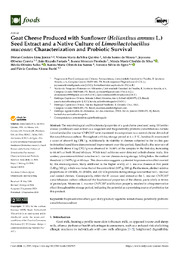Goat cheese produced with sunflower (Helianthus annuus l.) seed extract and a native culture of Limosilactobacillus mucosae: characterization and probiotic survival.
Goat cheese produced with sunflower (Helianthus annuus l.) seed extract and a native culture of Limosilactobacillus mucosae: characterization and probiotic survival.
Author(s): LIMA JÚNIOR, D. C.; QUIRINO, V. M. da S.; MOURA, A. S. de; CORREIA, J. O.; FURTADO, J. R.; FLORÊNCIO, I. M.; SILVA, M. M. C. da; SALLES, H. O.; SANTOS, K. M. O. dos; EGITO, A. S. do; BURITI, F. C. A.
Summary: Abstract: The microbiological and biochemical properties of a goat cheese produced using Helianthus annuus (sunflower) seed extract as a coagulant and the potentially probiotic autochthonous culture Limosilactobacillus mucosae CNPC007 were examined in comparison to a control cheese devoid of the autochthonous culture. Throughout a 60-day storage period at 6 ± 1 °C, lactobacilli maintained a count of above 8 log CFU/g. Additionally, its viability in cheeses subjected to the in vitro gastrointestinal conditions demonstrated improvement over this period. Specifically, the recovery of lactobacilli above 6 log CFU/g was observed in 16.66% of the samples in the first day, increasing to 66.66% at both 30 and 60 days. While total coliforms were detected in both cheese trials, this sanitary parameter exhibited a decline in L. mucosae cheeses during storage, falling below the method threshold (<3 MPN/g) at 60 days. This observation suggests a potential biopreservative effect exerted by this microorganism, likely attributed to the higher acidity of L. mucosae cheeses at that point (1.80 g/100 g), which was twice that of the control trial (0.97 g/100 g). Furthermore, distinct relative proportions of >30 kDa, 30–20 kDa, and <20 kDa proteins during storage was verified for L. mucosae and control cheeses. Consequently, either the H. annuus seed extract or the L. mucosae CNPC007 autochthonous culture influenced the biochemical properties of the cheese, particularly in terms of proteolysis. Moreover, L. mucosae CNPC007 acidification property resulted in a biopreservative effect throughout the storage period, indicating the potential as a promising source of probiotics for this product.
Publication year: 2024
Types of publication: Journal article
Unit: Embrapa Goats & Sheep
Keywords: Alimento funcional, Autochthonous culture, Biopreservative effect, CNPC007, Caprino, Cheese milk, Cheeses, Dairy goats, Dairy products, Extrato Vegetal, Food technology, Functional foods, Girassol, Goat cheese, Lactobacillus mucosae, Plant extracts, Potencial probiótico, Potentially probiotics, Probiotics, Produto Derivado do Leite, Queijo caprino, Queijo de cabra, Seed extracts, Semente, Sunflower seed, Tecnologia de Alimento, Vegetable extracts, Vegetable rennet cheese
Observation
Some of Embrapa's publications are published as ePub files. To read them, use or download one of the following free software options to your computer or mobile device. Android: Google Play Books; IOS: iBooks; Windows and Linux: Calibre.
Access other publications
Access the Agricultural Research Database (BDPA) to consult Embrapa's full library collection and records.
Visit Embrapa Bookstore to purchase books and other publications sold by Embrapa.

